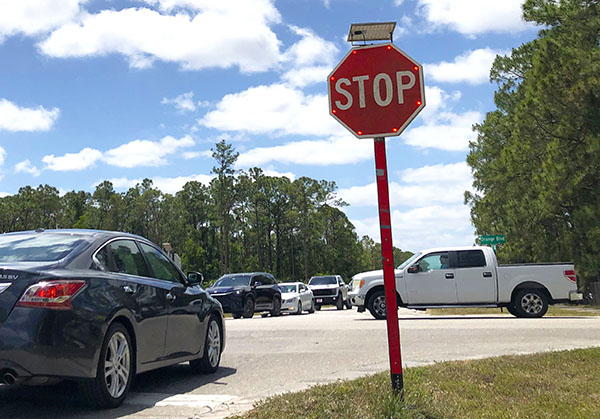Indian Trail Improvement District Supervisor Richard Vassalotti makes no bones about being on a mission to cut down traffic injuries and fatalities on ITID’s 458 miles of roads.
The retired Palm Beach County Fire-Rescue captain said he saw too much of it during his years on a fire engine, mostly in The Acreage. Much if it was caused by a lack of four-way stop signs and visible two-way stops, he has repeatedly said.
At the Wednesday, April 16 meeting of the ITID Board of Supervisors, Vassalotti took a step forward in that mission by getting the board to approve 50 solar-powered, LED stop signs with flashing red lights at a cost of approximately $60,000.
After 40 signs were suggested by staff, Vassalotti pushed for an additional 10, mostly along Banyan Blvd. “These two-way stops are deadly. It’s imperative we put up LED stop signs,” Vassalotti told fellow supervisors. “I’d like to see 50 of them. It would be one heck of a great way to make the roads safer out here.”
The board also agreed to add signage that reads: “Two-Way Traffic.”
Supervisor Betty Argue pointed out that the district already is $20,000 over budget for road signs in fiscal year 2025.
“Maybe we have a discussion about what other places the signs need to be… and that can go into our [fiscal year 2026] budget planning discussions,” said Argue, who also expressed concern that none of the LED signs were for intersections in the area known as the M-2. She said the intersection of West Alan Black and Cheetham Hill boulevards is especially dangerous.
An ITID staff report said the choice of locations was based on those intersections reported by the Palm Beach County Sheriff’s Office as repeat accident locations, a computer-generated accident study and ITID’s prevailing lane study. No intersections in the M-2 were identified in those studies as needing that sort of signage.
Vassalotti said more four-way stops are needed on main roads, but most of those are county roads, thus the county has control over signage on them.
“I ran mostly for these stop signs to happen, and to bridge the gap between ITID and the county,” he said. “If it saves one person, one crash, one injury, even a fender-bender, it’s worth it.”
ITID staff noted that there are 1,500 stop signs in the district, and that replacing them all with LED signs would cost more than $1 million.
“We know there’s a problem, and we must do whatever is within our power to do,” ITID President Elizabeth Accomando said this week. “But we can put up all the signs and speed bumps we want, and people still are not stopping for stop signs. We don’t have a signage problem. We have a people problem.”
In other business:
- The supervisors watched a short equine safety video created by Seminole Ridge High School TV production students Tamsin Lee and Reagan Bresnahan for the Equestrian Trails and Infrastructure Advisory Committee.
“I can’t say enough about how professional and organized they were,” Supervisor Patricia Farrell said of the students. “I’m really excited we could get the students involved in this.”
Committee Member Charlie James told the supervisors, “We need better trails. We need better crossings.”
James said vehicles often speed by horses and riders at 50 to 60 miles per hour.
“We need to protect our animals,” he said. “It’s way too dangerous on the roads out here.”
- The supervisors participated in a Saturday, April 26 workshop tour of three ITID parks — Coconut, Citrus Grove and Acreage Community Park, both north and south.
The public was invited to participate, and a small bus was rented for $1,000.
Only one member of the public, former Supervisor Joni Martin, who still is involved in parks issues, attended.
“It really disappointed me that no members of the public took part,” Accomando said after the tour. “If no one from the public cares enough to come out, spend a little time and learn about the parks, and share their views, it makes me wonder if we should be spending all this money on parks.”
Parks & Recreation Director Kenneth Lawrence has said that approximately $5 million will be needed in the near future to maintain and upgrade ITID’s 11 parks and their support infrastructure.








